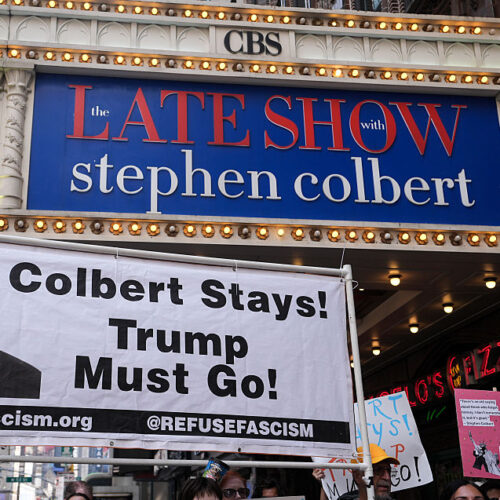Colbert canary in a coal mine
FCC now has “never-before-seen controls” over a newsroom, commissioner warns.
Dozens of anti-Trump protesters gathered outside the Ed Sullivan Theater, home of The Late Show with Stephen Colbert, to protest CBS’s reported decision to fire the longtime host, blaming political pressure and criticizing the network’s move as a blow to free speech. Credit: Anadolu / Contributor | Anadolu
The Federal Communications Commission has approved Skydance’s $8 billion acquisition of Paramount, which owns CBS.
But the agency’s approval drew fiery dissent from the only Democratic commissioner, Anna Gomez, after requiring written commitments from Skydance that allow the government to influence editorial decisions at CBS. Gomez accused the FCC of “imposing never-before-seen controls over newsroom decisions and editorial judgment, in direct violation of the First Amendment and the law.”
Under the agreement, FCC Chairman Brendan Carr explained that Skydance has given assurances that all of the new company’s programming will embody “a diversity of viewpoints from across the political and ideological spectrum.” Carr claimed that the requirements were necessary to restore Americans’ trust in mainstream media, backing conservatives’ claims that media is biased against Trump and appointing an ombudsman for two years to ensure that CBS’s reporting “will be fair, unbiased, and fact-based.” Any complaints of bias that the ombudsman receives will be reviewed by the president of New Paramount, the FCC confirmed.
But Gomez said that Americans will “pay the price” of Skydance’s “cowardly capitulation” to the Trump administration. She accused the FCC of using “its vast power to pressure Paramount to broker a private legal settlement [with Trump] and further erode press freedom,” claiming the requirements represent the Trump administration’s “coordinated campaign to censor speech, control narratives, and silence dissent.”
Colbert mocks Trump’s “cancel culture”
As soon as Trump took office, Carr took up the president’s fight with news networks, including CBS, reviving three dismissed complaints that alleged that broadcast stations were biased against Trump.
Fast-forward to this month, when Paramount agreed to a $16 million settlement to move past Trump’s claims that CBS’s 60 Minutes deceptively manipulated a pre-election interview with Kamala Harris. Senator Elizabeth Warren (D-Mass.) alleged the settlement was a bribe to get the Skydance deal done.
Recently, comedian Stephen Colbert—whose popular CBS Late Show will be cancelled next May despite being No. 1, in what many view as censorship due to his jokes about Trump—pointedly mocked the settlement the first chance he got, AP News reported.
Joking that “cancel culture’s gone way too far,” Colbert declared, “I can say what I really think of Donald Trump, starting right now.” He teased that Trump doesn’t seem to have the “skill set to be president,” then took a jab at the settlement after sarcastically acknowledging news reports that claimed leaked documents suggested that the Late Show was losing CBS at least $40 million annually.
“I could see us losing $24 million,” Colbert said. “But where would Paramount have ever spent the other $16 million? Oh, yeah.”
Like many protesting Colbert’s firing, Gomez suggested that the FCC’s requirements to approve the Skydance acquisition “may only be” the “beginning” of the Trump administration’s censorship and ongoing “assault on the First Amendment.”
Notably, the White House issued a rare statement in response to a recent South Park episode Paramount aired, which mockingly depicted Trump seducing Satan. The White House fumed that “no fourth-rate show can derail President Trump’s hot streak.” But Trump (whose current term’s ratings are at an all-time low) actually taking the time to acknowledge the episode drew jokes on social media that South Park may have riled Trump enough to scramble the Paramount acquisition approval. At the very least, the statement shows that Trump still cares what people say about him on TV, long considered the US president most obsessed with TV, and critics now fear perhaps he’s seized new powers to more effectively block negative coverage.
Warning that the “Paramount payout” and “reckless” acquisition approval together mark a “dark chapter” for US press freedom, Gomez suggested the FCC’s approval will embolden “those who believe the government can—and should—abuse its power to extract financial and ideological concessions, demand favored treatment, and secure positive media coverage.”
FCC terms also govern Skydance hiring decisions
Gomez further criticized the FCC for overstepping its authority in “intervening in employment matters reserved for other government entities with proper jurisdiction on these issues” by requiring Skydance commitments to not establish any DEI programs, which Carr derided as “invidious.” But Gomez countered that “this agency is undermining legitimate efforts to combat discrimination and expand opportunity” by meddling in private companies’ employment decisions.
Ultimately, commissioner Olivia Trusty joined Carr in voting to stamp the agency’s approval, celebrating the deal as “lawful” and a “win” for American “jobs” and “storytelling.” Carr suggested the approval would bolster Paramount’s programming by injecting $1.5 billion into operations, which Trusty said would help Paramount “compete with dominant tech platforms.”
Gomez conceded that she was pleased that at least—unlike the Verizon/T-Mobile merger—Carr granted her request to hold a vote, rather than burying “the outcome of backroom negotiations” and “granting approval behind closed doors, under the cover of bureaucratic process.”
“The public has a right to know how Paramount’s capitulation evidences an erosion of our First Amendment protections,” Gomez said.
Outvoted 2–1, Gomez urged “companies, journalists, and citizens” to take up the fight and push back on the Trump administration, emphasizing that “unchecked and unquestioned power has no rightful place in America.”
Ashley is a senior policy reporter for Ars Technica, dedicated to tracking social impacts of emerging policies and new technologies. She is a Chicago-based journalist with 20 years of experience.






